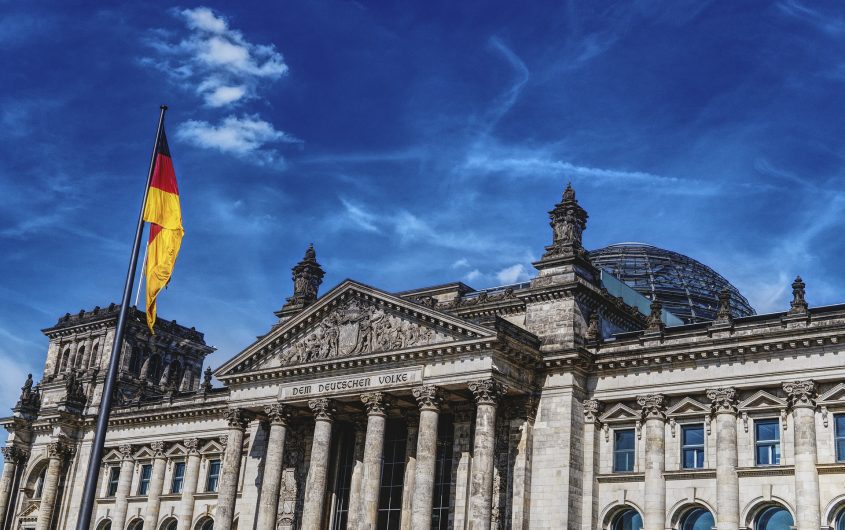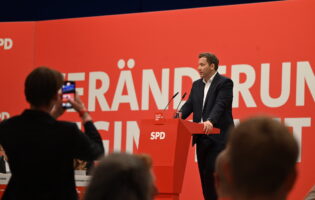
Image by FelixMittermeier from Pixabay
The 2021 Bundestag Election Year

Eric Langenbacher
Senior Fellow; Director, Society, Culture & Politics Program
Dr. Eric Langenbacher is a Senior Fellow and Director of the Society, Culture & Politics Program at AICGS.
Dr. Langenbacher studied in Canada before completing his PhD in Georgetown University’s Government Department in 2002. His research interests include collective memory, political culture, and electoral politics in Germany and Europe. Recent publications include the edited volumes Twilight of the Merkel Era: Power and Politics in Germany after the 2017 Bundestag Election (2019), The Merkel Republic: The 2013 Bundestag Election and its Consequences (2015), Dynamics of Memory and Identity in Contemporary Europe (co-edited with Ruth Wittlinger and Bill Niven, 2013), Power and the Past: Collective Memory and International Relations (co-edited with Yossi Shain, 2010), and From the Bonn to the Berlin Republic: Germany at the Twentieth Anniversary of Unification (co-edited with Jeffrey J. Anderson, 2010). With David Conradt, he is also the author of The German Polity, 10th and 11th edition (2013, 2017).
Dr. Langenbacher remains affiliated with Georgetown University as Teaching Professor and Director of the Honors Program in the Department of Government. He has also taught at George Washington University, Washington College, The University of Navarre, and the Universidad Nacional de General San Martin in Buenos Aires, Argentina, and has given talks across the world. He was selected Faculty Member of the Year by the School of Foreign Service in 2009 and was awarded a Fulbright grant in 1999-2000 and the Hopper Memorial Fellowship at Georgetown in 2000-2001. Since 2005, he has also been Managing Editor of German Politics and Society, which is housed in Georgetown’s BMW Center for German and European Studies. Dr. Langenbacher has also planned and run dozens of short programs for groups from abroad, as well as for the U.S. Departments of State and Defense on a variety of topics pertaining to American and comparative politics, business, culture, and public policy.
__
One of the most consequential German elections in memory will take place on September 26, 2021, when a new Bundestag, a new coalition government, and a new chancellor will be elected. We have known for years that the incumbent Chancellor Angela Merkel will be retiring from political life. As a consequence, we had expected 2020 and 2021 to be consumed by political machinations inside her party, the Christian Democratic Union, and among the other parties preparing for this consequential decision point. As in previous cycles, there would be a couple of months of campaigning before election day, coalition negotiations, and then, by early 2022 at the latest, a new team in place to tackle the challenges of the 2020s.
But 2020 and 2021 have not played out as expected. As current German Ambassador to the U.S. Emily Haber has put it, we need to differentiate between BC and AC—before and after Covid-19. Life has indeed changed considerably since the onset of the first truly global pandemic in a century in early 2020. Battling the coronavirus and dealing with a variety of negative consequences will dominate the political agenda for years to come—although there is still some uncertainty about the veracity of Ambassador Haber’s prediction that the pandemic will indeed be an existential inflection point, altering everything.
Certainly, German politics and society have been and will be dominated by the virus and its aftereffects for the foreseeable future.
Certainly, German politics and society have been and will be dominated by the virus and its aftereffects for the foreseeable future. Over 2020, the country recorded almost 2 million cases and over 30,000 deaths.[1] The country was lauded mid-year for its highly effective response including regional and then national shutdowns, strict quarantine procedures, contract-tracing, social distancing rules, and mask-wearing mandates. By the summer the most stringent measures were relaxed and a semblance of normalcy returned with restaurants, shops, and even cinemas reopening. But, by the early winter, the situation deteriorated and stricter measures were put back in place by the time of the holidays after the failure of “lockdown light” measures. In late December, the country was witnessing the rollout of several promising vaccines—one of which was developed in Mainz by Uğur Şahin and Özlem Türeci, Germans with a migration background, incidentally.
Economically, the pandemic has been disastrous with an approximate decline in Germany’s GDP by 5.6 percent in 2020, similar to the contraction of the great recession in 2009.[2] Nevertheless, healthy growth is expected for 2021 and 2022 making up for the current losses by the end of that period. Public finances have also taken a hit with the budget balance switching from a 1.5 percent surplus to a 6 percent deficit and overall debt levels increasing 12 points to about 71 percent of GDP. The prudent state finances of the last decade—no new debt (the schwarze null) and budget surpluses—coupled with extremely low interest rates prepared the country better than most for this latest challenge. By contrast, at the end of 2020, the public debt to GDP ratio according to some measures was over 100 percent in the UK, France, and the United States.[3] The new debt was necessary to fund two stimulus packages in March and June amounting to euro 286 billion, coupled with a variety of other emergency measures such as extending the short-term work benefits to 24 months and temporarily lowering the VAT rate.[4] Additional measures were implemented at the European level. Overall, economic relief amounted to over 20 percent of GDP in 2020 alone.[5]
Politically, the consequences of the pandemic have been marked. On the one hand, there has been an increase in anti-government protests—against lockdowns and other measures, against vaccines, and more generally—organized by a variety of groups, such as the so-called Querdenker (lateral thinkers) and other right-wing extremists.[6] At times, there have been tensions among the states and between states and the federal government, given that many policy measures are at the discretion of and implemented at the Land level. Nevertheless, the system of coordinated federalism worked rather well under the leadership of Chancellor Angela Merkel, Health Minister Jens Spahn, the Robert Koch Institute, and others. It certainly has performed better than the shambolic U.S. response.[7]
Despite the good polling and the near certainty that the next chancellor will come from the CDU/CSU, the CDU is in bad shape currently.
As for German voters, Merkel’s ruling CDU/CSU had lost substantial support since its 32.9 percent result in the 2017 Bundestag election. In summer 2019, polls saw the CDU even sink below the Greens to 25 percent support. But after the pandemic hit, the Union quickly gained back support—as high as 39 percent, but by the end of 2020 settling around 35-37 percent. The Greens have settled around 18-20 percent and even the hapless SPD has risen from a low of 12 percent to 16-17 percent (albeit still down considerably from their 20.5 percent in 2017). The right-populist Alternative for Germany (AfD) is polling in the 9-11 percent range, rather less than their almost 13 percent in 2017. Still, that party has not completely collapsed as many had predicted earlier in the year.[8] These shifts in support have endured over the year, but it is too early to tell what the effects of the pandemic on party support will be when Germans go to the ballot box in September 2021 to elect a new parliament and chancellor.
The pandemic has obscured attention from what has been going on structurally in German politics as the country and the party system adjust to the post-Merkel era. There is a 98 percent chance that Merkel will retire from political life after the 2021 election and a new chancellor will come to power. It is not 100 percent certain—there is no absolute certitude in political life after all. In power since 2005, Merkel could resign earlier than expected and it is not outside of the realm of possibility that she will go for another term. Even though she has clearly stated that she will not run again for the chancellorship and stepped down as CDU party leader in late 2018, given the other uninspiring leadership options, there is a slight chance she will stay on. (And I do not want to be one who underestimates her or to be yet again surprised.)
Despite the good polling and the near certainty that the next chancellor will come from the CDU/CSU, the CDU is in bad shape currently. After an unprecedented public campaign, the party very narrowly elected Merkel’s preferred centrist successor Annegret Kramp-Karrenbauer to be party chairwoman over the more conservative (and out of politics for over a decade) Friedrich Merz in December 2018. Kramp-Karrenbauer—formerly Minister-President of the Saarland and CDU General Secretary—struggled to unify the party, enforce her authority despite taking on the Defense Ministry in July 2019, or connect with voters to end the party’s sliding support. More generally, she could not articulate a clear course for the party—either doubling down on Merkel’s centrism or shifting to the right—and failed to articulate tactics to stop a surging right-populist AfD, especially in the East. After barely a year, she stepped down as party leader in February 2020. But then the pandemic hit and the CDU postponed its vote on a replacement from April to December, and then to January 2021. The contenders for the chairmanship are Armin Laschet, the centrist minister-president of North-Rhine Westphalia (Germany’s largest state), Norbert Röttgen, the chair of the Bundestag’s foreign affairs committee and a former environment minister, and Merz. Despite a tight race, Merz usually led in polls (though at one point CDUers preferred Spahn, who has supported Laschet).[9]
After the party selects a chairman, they must next choose a chancellor candidate to compete against those of the other parties—the SPD already chose finance minister Olaf Scholz in summer 2020. There is a good chance that Bavaria’s CSU Minister-President Markus Söder will get the nod this time as his popularity has soared during the pandemic. Indeed, polls in fall 2020 showed that Söder was the favorite of a majority of those surveyed and a massive majority of CDU/CSU supporters.[10] He is certainly more conservative than Merkel—criticizing her migration policy in 2015 for instance, opposing Eurobonds, and advocating for crosses to be placed in public buildings in his state.[11] But, no CSU candidate has ever become chancellor in the Federal Republic despite trying twice (Franz-Josef Strauss in 1980 and Edmund Stoiber in 2002). Also, Söder has only been minister-president since 2018, has never held national office and, interestingly for a Bavarian leader, is a Protestant from Franconia.
One of the biggest structural changes in German national politics over the last few decades is the emergence and stabilization of a six-party system.
There will be much political drama over the year before the all-important Bundestag election on September 26, 2021—as well as important regional elections in six states like Baden-Württemberg and Rhineland-Palatinate. Most analysts expect a Black-Green government of the CDU/CSU and Greens. There have already been successful coalitions of this nature in states like Baden-Württemberg and Hesse. Just such a combination has long been hinted at—there were even exploratory talks after the 2017 election—albeit with the Liberals. The FDP scuppered those efforts (and who are perilously close to the 5 percent threshold…again), paving the way for the continuation of the unloved (but actually quite stable) grand coalition of CDU/CSU-SPD in power since 2013, and previously from 2005 to 2009. The Greens have had much momentum over the last years and have not cratered in their support as has happened in the past. The current leadership duo of Annalena Baerbock and Robert Habeck—one of whom will be a chancellor candidate—are quite powerful and represent the more moderate, realo wing of the party. Nevertheless, if the CDU swings right under Merz and if Söder sticks to a rightist stance, it will be quite difficult to negotiate a coalition contract.
But, the options for government formation are quite limited. One of the biggest structural changes in German national politics over the last few decades is the emergence and stabilization of a six-party system (seven if one considers the CSU as truly separate). Gone forever are the halcyon days of a two and a half party system with the CDU/CSU, SPD, and FDP. The Greens were established in the 1980s, the PDS/Left in the 1990s/2000s, and the AfD in the 2010s. The challenge is that a coalition with 50 percent of the seats has to be formed without the 12.5 percent of seats held by the AfD or the 9.7 percent of the Left—almost a quarter of the Bundestag. Both of these parties are considered koalitionsunfaehig—not acceptable coalition partners—although this may be changing with the Left Party, which has long been in coalitions at the state level. This constraint is one reason for the recent frequency of grand coalitions, the length of government formation (almost six months after the 2017 election), or the possibility of a more unstable three-party government. How to deal with the AfD is one of the biggest questions in German politics, with unofficial cooperation between mainstream parties like the CDU creating a national scandal in early 2020 in Thuringia (and prompting Kramp-Karrenbauer’s resignation).
Of course, the pandemic and the daily drama of politics should not completely obscure everything else that will need to be addressed. The abysmal relationship with the United States needs to be mended. Russian and Chinese aggression (of different types) needs to be confronted and the growing illiberalism in countries like Poland, Hungary, and Turkey are festering sores. Another migration crisis is quite possible given persistent instability in the Arab world, sub-Saharan Africa, and Central Asia. At home, growing right-wing extremism outside and inside of the German state can no longer be ignored.[12] Right-extremist terrorism, including the Halle Synagogue attack in October 2019 and the murder of ten in Hanau in February 2020, is an existential threat. The Eurozone is not out of the woods even a decade after the Euro crisis and the consequences of Brexit will need to be accommodated. The aging and graying population are still structural hurdles and continuing to foster a multicultural society is a must. Delayed investments in infrastructure and kick-starting the stagnant Energiewende are overdue.[13] As the muted thirtieth anniversaries of the fall of the Wall in November 2019 and reunification in October 2020 reminded us, eastern Germany is still far from a “blossoming landscape” and is rapidly embracing the right-populism of the AfD.
Angela Merkel has led Germany well for over fifteen years through an unprecedented series of crises, not just maintaining the welfare state, but also creating more equity for minorities, women, and the LGBTQ community.[14] She has also presided over a “silver age” of economic expansion and trading prowess.[15] But, at some point in 2021 or early 2022 someone else will need to steer the German political system through these storms—old and new. How will this new leader respond to all of these challenges? Will he or she finally find a way for Germany to effectively lead in Europe and beyond? Will right-wing extremism be sufficiently combatted?
These are some of the main questions we will address in our year-long series of on-line (and hopefully in-person) events devoted to the epochal 2021 Bundestag election.
[1] https://coronavirus.jhu.edu/map.html
[2] https://ec.europa.eu/info/business-economy-euro/economic-performance-and-forecasts/economic-performance-country/germany/economic-forecast-germany_en
[3] https://www.gfmag.com/global-data/economic-data/public-debt-percentage-gdp
[4] https://www.imf.org/en/Topics/imf-and-covid19/Policy-Responses-to-COVID-19#G
[5] https://time.com/5923840/us-pandemic-relief-bill-december/
[6] https://www.dw.com/en/coronavirus-anti-lockdown-group-put-under-surveillance-in-german-state/a-55878122
[7] https://www.dw.com/en/coronavirus-in-germany-how-the-federal-system-hampers-the-fight-against-the-pandemic/a-55241135; https://policyoptions.irpp.org/magazines/december-2020/how-germanys-federation-co-ordinated-a-pandemic-response/
[8] /2020/03/has-the-coronavirus-pandemic-broken-the-populist-fever/
[9] https://www.deutschlandfunk.de/cdu-wer-wird-neuer-parteivorsitzender.2897.de.html?dram:article_id=470100
[10] https://de.statista.com/statistik/daten/studie/1067947/umfrage/kanzlerkandidatur-fuer-die-union/
[11] https://www.welt.de/regionales/bayern/article176865232/Kreuzpflicht-in-Bayern-tritt-mit-kleinen-Ausnahmen-in-Kraft.html
[12] https://www.nytimes.com/2020/12/29/world/europe/germany-far-right-terrorism-refugee.html?action=click&module=Well&pgtype=Homepage§ion=World%20News
[13] https://www.economist.com/europe/2019/11/14/why-germany-sticks-to-strict-budget-rules-despite-a-slowdown
[14] Joyce Marie Mushaben, Becoming Madam Chancellor: Angela Merkel and the Berlin Republic (Cambridge: Cambridge University Press, 2017).
[15] Stephen J. Silvia, “A Silver Age? The German Economy Since Reunification,” German Politics and Society, 37, no. 4 (2019): pp. 74-94.









